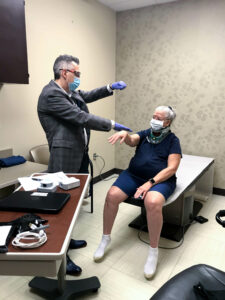
To the FSHD community, we’re sharing this invitation from Drs. Statland and Tawil to join the MOVE study. It is open to individuals with FSHD of all ages residing in the U.S. This is the largest-ever natural history study of FSHD, with data collected during your annual visit to the doctor.
We can’t stress enough how important this study is! Previous natural history studies were restricted to adults 18-75 and required making a time-consuming trip to visit a research center. These restrictions mean that there remain critical gaps in our understanding of FSHD. There is scant data on patients under 18, a major gap considering that most people are diagnosed during their early adolescent years, precisely the time when you’d want future drug therapies to be given in order to prevent further muscle damage. Gathering solid data on this age group could be important to ensure that future therapies are available to those under 18. There is also little data on all kinds of groups that are under-represented in previous studies, including racial and ethnic minorities, rural populations, and anyone who finds it difficult to travel, take time off from work, etc., to participate in a research study.
By incorporating the MOVE study into patients’ annual clinic visit, researchers hope to collect data on a group that more fully represents the FSHD community. But to succeed in this important goal, they need your involvement! If you have family and friends who have FSHD, please encourage them to participate as well.
- Download the MOVE Fact Sheet for more details and contact information.
- Visit the MOVE study listing at clinicaltrials.gov and scroll to the bottom of the page for a list of sites to see if there is one near you.
- Email Michaela Walker, project manager, to find out how to get involved.
Greetings FSHD Community,
Researchers from the Facioscapulohumeral Muscular Dystrophy Clinical Trial Research Network (FSHD CTRN) would like to ask you to participate in a research study called MOVE-FSHD: Motor Outcomes to Validate Evaluations in FSHD.
We are seeking 450 volunteers to participate in the MOVE study. Most people with FSHD will be eligible. If you and/or your child choose to participate in this study, you will be asked to complete 3 visits over 3 years. Each visit will include a physical exam, health-related questionnaires, strength, function, and breathing assessments. There is an optional blood draw and saliva test.
Remember, your participation is completely voluntary, and you are not required to participate. If you have any questions about the study, please email the research project manager at mwalker20@kumc.edu.
Thank you for considering to be part of this study!
Sincerely
Jeffrey Statland, MD
Professor of Neurology
The University of Kansas Medical Center
Rabi Tawil, MD
Professor of Neurology
The University of Rochester Medical Center


I am interested in participating in this study. I am 69 and have a confirmed genetic diagnosis of FSHD type 1. My son, age 40, appears to have FSHD as well. He has an appointment with my neurologist on 10/31. It also appears that his 6 year old daughter may have it as well.
Thanks so much for your interest in participating! Please contact Michaela Walker at the University of Kansas. She can help get your family set up to participate. mwalker20 @ kumc.edu